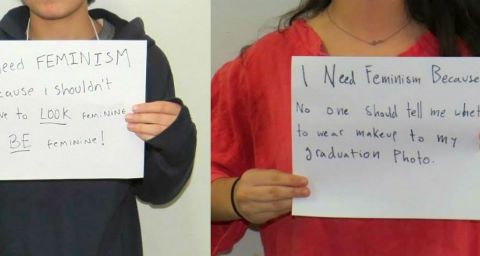Grin and Bare It: Students Tackle Casual Sexism

Note: Yesterday’s Praxis post, “What Your Yearbook Photo Says About Your Gender,” critiqued the latent sexism in instructions to students at a New York City school on how to primp for their senior portraits. Today, two students at the school, founders of STAGE (Students Taking Action for Gender Equity), share their perspective.
By ISABEL CRISTO and PRIYA DIETERICH, guest bloggers
Day in and day out, from our toddler days on the playground to our graduation photos, gender is imposed upon us. In our own ways, we—children and adults alike—have a responsibility to shake off those restrictions.
Receiving instructions for how to prepare for our senior photos immediately set our grade abuzz. At first glance, we all noticed how much longer the directions for girls were compared to those for the boys. And in a school particularly conscious of gender issues, this in itself was cause enough for indignation. The message to the girls was patronizing— “Remember, the photo will only look as good as you do” —and ridiculously demanding compared to the guys’ instructions. We have been jokingly quoting it for the last week and a half, reminding each other of the helpful hints from the photography studio: “Don’t you DARE try a new hairstyle,” and “The photo will require your bare shoulders!”
The instructions made it abundantly clear that we were meant to place ourselves firmly within the binary system of gender and conform to the highly stereotyped ideal of masculine and feminine attractiveness. We were not asked to dress in what made us personally comfortable or confident, or in a way that felt true to ourselves. The whole thing felt very foreign and outdated.
It was one of our male friends who suggested that all the boys in our grade should get their photos taken in the off-the-shoulder gown, which would’ve been hilarious. Ultimately, few students wanted to sacrifice their senior picture for the sake of a political statement. It could’ve been great if we’d gone for it, but I don’t fault my grade for failing to organize a mass gender-reversal photo campaign. It’s understandable that people want nice, non-controversial pictures to send to the families.
So we didn’t revolt against the photography studio and boycott our pictures. But we are not the only ones complicit in this offense. The photography studio (and it is the norm, not the exception) has made a choice to foster gender conventionalism, and not to take part in the growing movement away from archaic stereotypes. The administration of our high school, which delivered the information from the studio to us, had an opportunity and responsibility to acknowledge and confront how problematic the gendered instructions are, and they did not do so. On all levels, there was a failure to tackle—and perhaps even to recognize—this not-so-subtle display of casual sexism.
It’s important to note that our school is a safe and liberal environment, so much so that the instructions from the studio had very little effect on how students chose to present themselves on picture day. (Overheard in the bathroom today: “I’m not plucking my eyebrows, not for you, not for nobody.”) We are generally very self-assured teenagers. The instructions made clear how anomalous our safe and open environment really is.
Because these gender expectations are not pervasive in our school environment, it was particularly jarring to encounter them on a 3 x 5 card of instructions from a portrait studio. As a community we have, in many ways, been sheltered from such expectations. We may have had a bit of curiosity about something that was so traditional and old-fashioned and ridiculous. The off-the-shoulder gown and the rose felt like vestiges of a high school experience we have never had. We admitted this moment of convention into our environment because we are confident that it will not change the way we consider ourselves or each other.
Though we know of no openly trans students at our school, there are plenty of people who don’t conform to highly stereotyped masculine and feminine standards (in hair length and fashion choices and so on). One biologically female student, in a recent meeting of our feminist club, told us that she is open to pronouns of either gender, and would really like to experience being referred to by male pronouns. Today, she is dressed for her senior picture in a button down shirt, suit jacket, and tie.
The discussion over senior photos that has filled the hallways recently has been a lesson in how important it is to point out seemingly mundane instances of gender bias. Something we’ve discussed a lot in our recent meetings, and with each other, is the idea of feminism as practice. Small instances like this remind us of how constantly we are asked to define ourselves based on our assigned gender.
In the end, most of us took a few shots in our own clothes, which ranged from fancy velvet dresses to tee shirts, and some friends opted out of the bare shoulder picture altogether. Both of us did all the poses, including the silliest one, with a fake rose in hand. The photographers always asked us which poses we wanted to do and there was no sense of coercion or pressure.
In past years at our school, students have taken issue with the photo instructions as well. (Although we have not always used the same photography studio, the bare-shoulder pose is ever present). There were small acts of protest. In 2008, Melanie Steinhart wore a fake moustache along with her off-the-shoulder gown only to have her facial hair photoshopped out of the final cut. From what some alums have told us, it seems that some years the instructions were not handed out. One graduate suggested that her grade was not instructed so ridiculously because the grade before them had put up a substantial fuss about it. In the context of more dire gender-based inequities in our society, throwback sexism in yearbook photos is a rather small issue. Still, small injustices call for small rebellions.
Isabel Cristo and Priya Dieterich will graduate from Bard High School Early College with Associate of Arts degrees in June. They co-founded and lead STAGE: Students Taking Action for Gender Equity.





